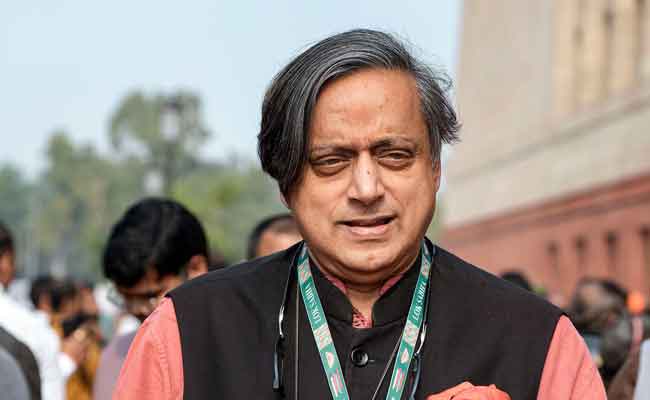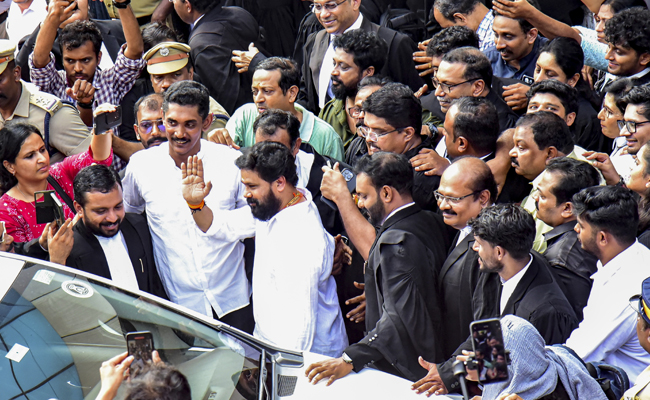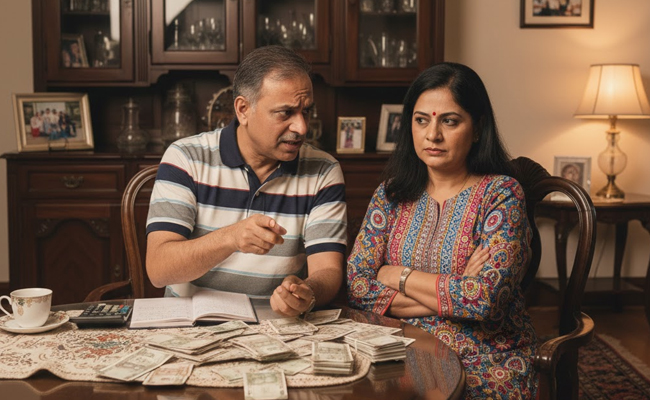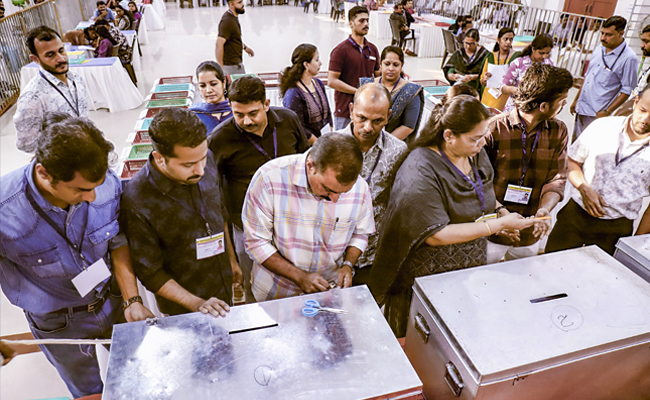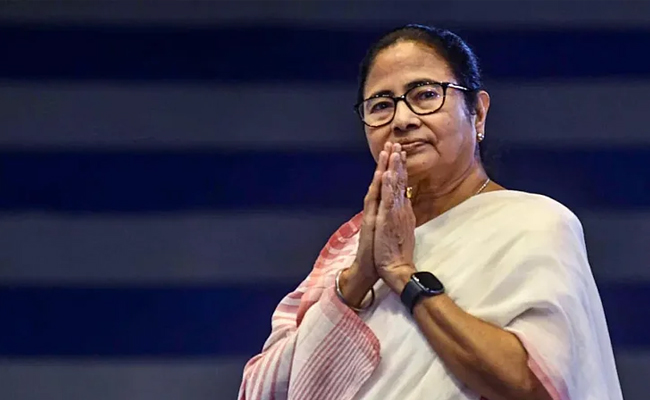New Delhi (PTI): Opposition parties, campaigning together or against each other, will join hands after the Lok Sabha polls, says Congress leader Shashi Tharoor, asserting that the people will get a prime minister who is first among equals and listens to others with an INDIA bloc coalition government.
Including the Trinamool Congress in his argument on opposition parties getting together after the “day of reckoning” on June 4, Tharoor said in an interaction with PTI editors at the news agency's headquarters that a coalition government is nothing to be afraid of.
“The growth performance of the Indian economy has been better under such dispensations than under single party governments,” he said.
In his view, this is an election for "change" and as of now the BJP has "lost its grip" on the narrative.
The Congress Working Committee (CWC) member also defended the party's decision to not attend the 'pran pratishtha' ceremony at the Ram temple in Ayodhya, saying it was right to turn down the invitation as it was "essentially a political platform for the greater glorification of Prime Minister Narendra Modi".
"It would have been a mistake in my view had we done it. As a purely political decision, it was the right one," he said during the freewheeling interaction.
ALSO READ: '400 paar' a joke, '300 paar' impossible, '200 paar' challenge for BJP: Shashi Tharoor
Tharoor said it is true a coalition government functions very differently from a monolithic one-party government.
"Given Mr Modi's style, the personality cult built around him, and the way the BJP has been ruling, I think it is fair to say that it (an INDIA bloc government) would be very unlike what we have seen in the last 10 years," he said, confident that the Indian National Developmental Inclusive Alliance (INDIA) will form the next government.
The record and experience of the Indian public with coalition governments has been rather good, the former Union minister said.
"So, in many ways the advantage of a coalition is that there won't be any sort of autocratic tendencies whoever becomes prime minister... they will have to take into account the others. Frankly, it is the classic political theory of parliamentary systems of governance. Right now we are seeing a parliamentary system being run presidentially which is the worst of both the worlds," Tharoor argued.
"If you have a coalition government of the INDIA bloc, you are going to see, for the first time in a long while, a PM who is first among equals, who has to listen to others, take their point of view into account and who would have to be a good manager," he said.
"Mr (Atal Bihari) Vajpayee is considered in many ways an excellent example of that kind of consensus builder. He did not have a majority, far from it… he had 26 parties in his coalition but his government was able to deliver effective results and at the same time reassure Indians that they had a functioning government," Tharoor said.
The author-politician also hailed former prime minister Manmohan Singh's style of governance, saying he was able to pursue "very relentlessly" his economic goal and preside over the best growth period India has ever seen.
Noting that the coalition of UPA-1 broke and the Left quit the government and was not part of UPA-2, Tharoor said there is always the issue on which a prime minister may have to draw the line for one or more of his coalition partners.
"So my own view is let us be reassured that our history in operating the system in the Constitution we have has by and large safeguarded the interest of the people. There have been many periods when people have been absolutely doomsaying about our country and we have come through all those periods," he said.
"I would say... coalition government is nothing to be afraid of and certainly when I speak to most voters they are thinking in terms of who is the candidate 'I am voting for', what values does he or she represent, who do they bring to power in Delhi and how is that power going to be exercised," Tharoor said.
Asked about contradictions in the INDIA bloc as seen in bitter exchanges between the Congress and the Left in Kerala and whether that would be an impediment in the formation of a cohesive government, Tharoor pointed out that the UPA and the Vajpayee-led NDA before that came together after the elections.
"So the truth is that in our country coalitions come after the polling...This is an unusual case where a serious attempt was made to bring people together before voting even took place. It was very clear to all of us that the coalition will work on a state by state basis," he said.
Citing the example of Kerala, Tharoor said it was unthinkable that the Congress which leads the UDF and the Communists who lead the LDF would ever be partners in the state.
"We have been fighting each other and at loggerheads for the last 55 years and alternating in power until the last election, so there was no question of that even being feasible. Having said that, right next door in Tamil Nadu, the same party, CPI(M), CPI, the Congress, our ally Muslim League and the DMK are all partners, have been partners and continue to be partners, there is no issue," he said.
"Finally when it comes to the day of reckoning on June 4 (when results are declared), I have no doubt that all these parties whether or not they are campaigning together or against each other, including the Trinamool Congress, when we have the numbers to prevent the BJP coming to power, we will come together," Tharoor asserted.
Tharoor said he has friends in parties that are not allied with the Congress who have been telling him that after June 4 "we will work together".
According to him, the “hubristic narrative” before the first phase is over.
“I don't think we are going to hear people say 'abki baar 400 paar' again for some time to come," the Congress leader said.
Let the Truth be known. If you read VB and like VB, please be a VB Supporter and Help us deliver the Truth to one and all.
Kochi (PTI): The prosecution had "miserably" failed to prove the conspiracy charge against Dileep in the sensational 2017 actress sexual assault case, a local court has observed while citing inconsistencies and lack of sufficient evidence against the Malayalam star.
The full judgement of Ernakulam District and Principal Sessions Court Judge Honey M Varghese was released late on Friday, and has revealed the judge also pointing out at unsustainable arguments put forth by the prosecution.
"The prosecution miserably failed to prove the conspiracy between accused No.1 (Pulsar Suni) and accused No.8 (Dileep) in executing the offence against the victim," the court held.
It examined in detail, the prosecution's allegation that Dileep had hired the prime accused to sexually assault the survivor and record visuals, including close-up footage of a gold ring she was wearing, to establish her identity.
On page 1130 of the judgment, under paragraph 703, the court framed the issue as whether the prosecution's contention that NS Sunil (Pulsar Suni) recorded visuals of the gold ring worn by the victim at the time of the occurrence, so as to clearly disclose her identity, was sustainable.
The prosecution contended Dileep and Suni had planned the recording so that the actress' identity would be unmistakable, with the video of the gold ring intended to convince Dileep that the visuals were genuine.
However, the court noted that this contention was not stated in the first charge sheet and was introduced only in the second one.
As part of this claim, a gold ring was seized after the victim produced it before the police.
The court observed that multiple statements of the victim were recorded from February 18, 2017, following the incident, and that she first raised allegations against Dileep only on June 3, 2017.
Even on that day, nothing was mentioned about filming of the ring as claimed by the prosecution, the court said.
The prosecution failed to explain why the victim did not disclose this fact at the earliest available opportunities.
It further noted that although the victim had viewed the sexual assault visuals twice, she did not mention any specific recording of the gold ring on those occasions, which remained unexplained.
The court also examined the approvers' statements.
One approver told the magistrate that Dileep had instructed Pulsar Suni to record the victim's wedding ring.
The court observed that no such wedding ring was available with her at that time.
During the trial, the approver changed his version, the court said.
The Special Public Prosecutor put a leading question to the approver on whether Dileep had instructed the recording of the ring, after which he deposed that the instruction was to record it to prove the victim's identity.
The court observed that the approver changed his account to corroborate the victim's evidence.
When the same question was put to another approver, he repeated the claim during the trial but admitted he had never stated this fact before the investigating officer.
The court noted that the second approver even went to the extent of claiming Dileep had instructed the execution of the crime as the victim's engagement was over.
This showed that the evidence of the second approver regarding the shooting of the ring was untrue, as her engagement had taken place after the crime.
The court further observed that the visuals themselves clearly revealed the victim's identity and that there was no need to capture images of the ring to establish identity.
In paragraph 887, the court examined the alleged motive behind the crime and noted that in the first charge sheet, the prosecution had claimed that accused persons 1 to 6 had kidnapped the victim with the common intention of capturing nude visuals to extort money by threatening to circulate them and there was no mention about Dileep's role in it.
The court also rejected the prosecution's claim that the accused had been planning the assault on Dileep's instructions since 2013, noting that the allegation was not supported by reliable evidence.
It similarly ruled out the claim that Suni attempted to sexually assault the victim in Goa in January 2017, stating that witness statements showed no such misconduct when he served as the driver of the vehicle used by the actress there.
The court also discussed various controversies that followed Dileep's arrest and the evidence relied upon by the prosecution, ultimately finding that the case had not been proved.
Pronouning its verdict on the sensational case on December 8, the court acquitted Dileep and three others.
Later, the court sentenced six accused, including the prime accused Suni, to 20 years' rigorous imprisonment.
The assault on the multilingual actress, after the accused allegedly forced their way into her car and held it under their control for two hours on February 17, 2017, had shocked Kerala.
Pulsar Suni sexually assaulted the actress and video recorded the act with the help of the other convicted persons in the moving car.

